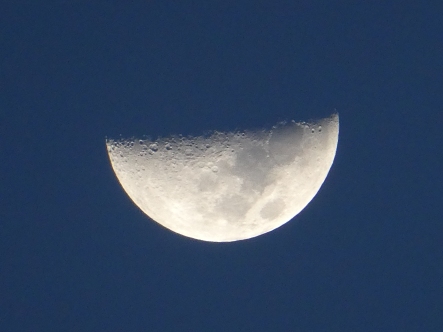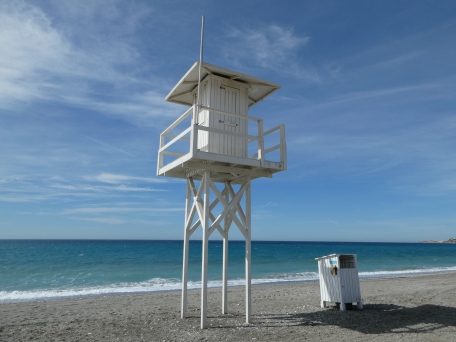That’s part of the Sierra Nevada mountain range in Southern Spain. The little town that can just be seen nestled on the slopes is Frigiliana.
Yes, I know, we’ve been away to the sun again. I make no apologies because it’s cheaper than Skegness. Anyway, I’ve scattered a few Spanish photos throughout this blog in an attempt to provide a little light relief from the subject matter.
A couple of things that have caught my attention this month: Golliwogs and Bullying. Both distasteful and both of which led me to think of the third subject that I will come to later.
Golliwogs. We all remember them from childhood, at least, those of a certain age do. I guess that would be the over fifties. I’m not sure what understanding folk younger than that would have of them. They are in the news again though.  It’s almost as if there was some weird roundabout system that keeps regurgitating the same sort of stuff for us to be distracted by every now and again. I don’t think it’s an accident. The current falling out surrounds a pub in Essex that had its Golly shelves cleared by the local rozzers. Cue massive outrage by people with little or no intelligence. The owners came out with the usual defence of the toys: harmless, nostalgic, just a bit of fun. And I do, sort of, understand that point of view, because it’s one I held as a small child. But then I’m not black. But I’m also not a twat so I also understand the offence that it causes as well. I had a golliwog doll back in the sixties (or, more likely, my sister did) and it’s true that we, as children, didn’t associate them with black people. But it doesn’t take a lot of digging to discover the origin of the doll. Florence Kate Upton wrote a story, ‘The Adventures of Two Dutch Dolls’ in 1895. The two main characters, Peg and Sarah Jane, are the dolls in the title and, whilst having an adventure in a toy store, they came across, ‘a horrid sight, the blackest gnome.’ Hardly a positive image. Enid Blyton didn’t help matters either, painting her own golliwog as villains. They were removed from revised editions forty years ago. But then it seems someone always wants to go too far: we’ve just had the words ‘Fat’ and ‘Ugly’ taken out of Roald Dahl novels. This kind of knee-jerk response doesn’t help at all, in fact it encourages those, like the landlord of The White Hart Inn in Essex, who insisted on ‘hanging’ his golliwogs by the neck, As he said, ‘They used to hang them in Mississippi years ago.’ So that’s okay then.
It’s almost as if there was some weird roundabout system that keeps regurgitating the same sort of stuff for us to be distracted by every now and again. I don’t think it’s an accident. The current falling out surrounds a pub in Essex that had its Golly shelves cleared by the local rozzers. Cue massive outrage by people with little or no intelligence. The owners came out with the usual defence of the toys: harmless, nostalgic, just a bit of fun. And I do, sort of, understand that point of view, because it’s one I held as a small child. But then I’m not black. But I’m also not a twat so I also understand the offence that it causes as well. I had a golliwog doll back in the sixties (or, more likely, my sister did) and it’s true that we, as children, didn’t associate them with black people. But it doesn’t take a lot of digging to discover the origin of the doll. Florence Kate Upton wrote a story, ‘The Adventures of Two Dutch Dolls’ in 1895. The two main characters, Peg and Sarah Jane, are the dolls in the title and, whilst having an adventure in a toy store, they came across, ‘a horrid sight, the blackest gnome.’ Hardly a positive image. Enid Blyton didn’t help matters either, painting her own golliwog as villains. They were removed from revised editions forty years ago. But then it seems someone always wants to go too far: we’ve just had the words ‘Fat’ and ‘Ugly’ taken out of Roald Dahl novels. This kind of knee-jerk response doesn’t help at all, in fact it encourages those, like the landlord of The White Hart Inn in Essex, who insisted on ‘hanging’ his golliwogs by the neck, As he said, ‘They used to hang them in Mississippi years ago.’ So that’s okay then.
It’s all a matter of context and intention. I know that most of the people who are mystified that golliwog dolls are now deemed offensive don’t harbour evil thoughts towards people with skin colour different to their own. But it does raise the question of why these dolls appeared in the first place. We can only speculate but, if you want to create a society that is intolerant of certain individuals then it is necessary to create an environment in which that intolerance is accepted. Maybe that’s why golliwog dolls were for young people. Pave the way for future prejudice. Make it normal to laugh or sneer at those who are different to the accepted norm. Okay, so it’s a bit of a stretch to accuse the doll makers as being part of some evil plot to make us all hate people from Africa and the Caribbean but it definitely provided a means towards harbouring intolerance. I know that black people have, in the past, hit back with their own offensive language: ‘white trash’ or ‘honky’ and I’ve heard white people defend their own racism by the argument of, ‘If it’s okay for them then it’s okay for us.’ But there are just too few black people and too many white people for it to be effective. Plus, as an indicator of how effective offensive terms for white people actually are, try Googling and finding some. Apart from the two I’ve just mentioned, there really aren’t any.
The landlord in Essex was clearly trying to be offensive and, oddly, Cruella Braverman tried to profit from the faux outrage that ensued by claiming that she’d reprimanded the police for over-reacting and confiscating the dolls in the first place. It’s very telling that she did no such thing. She just thought it would play to her rather elderly and rabidly right-wing base of supporters to say that she had. It speaks volumes.
There’s an old article by Lemm Sissay in which he talks about his experience of golliwogs in the Shetland islands that’s worth a look (and follow up on the upset that it caused) and an even older, marvellous takedown of Enoch Powell by the late, great Jonathan Miller.
 Of course, this all opens me up to accusations of being one of the ‘Wokerati’. Something that I have proudly embraced on here before. A ‘woke’ person is one who can empathise, therefore, it follows that a ‘non-woke’ person is one who can’t empathise. By that argument, an ‘anti-woke’ person is someone who works actively against empathy. I know which I would rather be.
Of course, this all opens me up to accusations of being one of the ‘Wokerati’. Something that I have proudly embraced on here before. A ‘woke’ person is one who can empathise, therefore, it follows that a ‘non-woke’ person is one who can’t empathise. By that argument, an ‘anti-woke’ person is someone who works actively against empathy. I know which I would rather be.
Which brings me to my second observation: Bullying.
I was bullied as a child. It was unpleasant, frightening, and coloured everything from waking to going to sleep. I can’t remember if I ever dreamed of being bullied because it was too long ago but I have felt those similar fears since, as an adult. There’s a similar argument here to that which the golliwog supporters would use: ‘It’s all a bit of fun and don’t be too sensitive about it.’ Or, ‘Grow thicker skin; it never did me any harm.’ Which is hardly the point if you are crying yourself to sleep every night. It is a little more nuanced than racism though. I was over-protected by my parents (not complaining, they were lovely) so it was abnormal for anyone to be mean to me. I was also, effectively, an only child as my sister was seven years younger than me. But I won’t blame my mum and dad for the behaviour of some over-confident dick at school or in the street. Of course, I am also aware that those who did the bullying were likely being bullied themselves and that it was their kind of normal. Abuse leads to abuse. Too big a subject to go into here. But I remember a few particular bullies from my early days. I remember being marched home from school by a boy who pinched me firmly at the back of my neck. I don’t know if they were bones or tendons that he trapped but it hurt, a lot. I remember another boy who would find me every morning in the playground when I first moved to Chesterfield at the age of twelve and would push be backwards and ask, ‘Are thara puff?’ I had a different accent so that was enough to mark me out as a target. I also remember a big, aggressive girl who used to kick the back of my chair throughout an entire French lesson. It made me hate French with a passion (the language, not the people). Like I said, a bit over-protected and maybe a bit over-sensitive. It doesn’t reduce the anxiety one bit though.
Strangely, the boy who walked me home holding my neck was supposed to be my friend and the guy who questioned my sexual proclivities so early on failed to grow any taller than we were at twelve. I remember bumping into him when I was around sixteen and just laughing. Maybe that was bullying, too. I did eventually try and deal with the girl who was wearing out her shoes on the back of my chair though. I stood, turned around and bawled her out. It took every ounce of courage I possessed (which wasn’t very much). The teacher was appalled that a boy would treat a girl in such a way and I was hauled off to the headmaster and was given the cane. I was given it again at a later date for washing a muddy netball that boys had nicked off the girls while they practised and I was trying to alleviate the offence. It didn’t work. For some inexplicable reason I was considered to be the ringleader. The scene in ‘Kes’ where the innocent boy is caned was particularly poignant for me. And, the day I left school was one of the happiest days of my life.
But it’s not confined to school, is it? We come across it as adults as well.
 I’ve actually lost count of the number of MPs who have been accused and found guilty of bullying but it seems to be something of an epidemic. And we’ve had enough of those! But the same, tired accusations are being hurled at those who are the victims: too sensitive, can’t deal with positive management, too weak for the job. I thought ‘victim blaming’ was frowned at but apparently not. Just reading the Dominic Raab’s resignation letter makes that abundantly clear. He’s managed to turn an event which would shame even the most shameless of us into something that will harm the nation by its removal. The right-wing press loved it. And I wouldn’t be terribly surprised to see him reprise his role as senior minister before the year is out. It’s all about whether you’re in the gang or not nowadays. Only yesterday, I think, there have been similar accusations levelled at the current health secretary.
I’ve actually lost count of the number of MPs who have been accused and found guilty of bullying but it seems to be something of an epidemic. And we’ve had enough of those! But the same, tired accusations are being hurled at those who are the victims: too sensitive, can’t deal with positive management, too weak for the job. I thought ‘victim blaming’ was frowned at but apparently not. Just reading the Dominic Raab’s resignation letter makes that abundantly clear. He’s managed to turn an event which would shame even the most shameless of us into something that will harm the nation by its removal. The right-wing press loved it. And I wouldn’t be terribly surprised to see him reprise his role as senior minister before the year is out. It’s all about whether you’re in the gang or not nowadays. Only yesterday, I think, there have been similar accusations levelled at the current health secretary.
I do have some (tiny) amount of sympathy for the idea that bullying is, to some extent, in the mind of the bullied. I started working in education at the turn of the millennium (do millenniums turn?). From being nothing more than a dad of four kids I suddenly found myself alone, in charge of eight seven year olds. It was my job to teach them to read and write (long story). They were lovely kids but it took them all of two minutes to realise that they had the upper hand with me. I knew I was stuck for thirty minutes with no support and only myself to deal with these (very lovely) monsters. They ran rings around me and I felt my anxieties rising in a way that I hadn’t felt since my pre-teens. I felt bullied. It was real and it was so familiar that it scared the pants off me. Now, there is no way that those kids were being mean. They were having a laugh. And I laugh about it now. But it felt very real at the time and I honestly thought that maybe I couldn’t do ‘this’. I got over it and became good at what I was doing but I’ll never forget that feeling around that tiny, circular desk that my knees would not fit under. A fear borne out of a lack of confidence in my own ability. Should I blame my parents for this, too?
Nevertheless, I’ve also felt it from adults who knew exactly what they were doing. And, with hindsight, I realise that the adults who would expose and exploit any weakness ‘however carefully hidden’ were often inadequates in their own right. This seems to be the tactic used by the likes of Raab et al (and counting). The outbursts will likely to have been in similar situations to those I’ve witnessed when a manager or supervisor is about to get owned by some underling and their only available response is to turn aggressive and use the powers that their seniority gives them to shut that person down. I know it’s all about the bully’s own low self-esteem but that’s little consolation to the person on the receiving end. Especially as, often, the person behaving badly has the power to inflict financial penalties or worse on an individual. I actually found myself in that position in my fifties and was really surprised, not just that I found myself there at that point in my life but also, just how badly it got under my skin.  It has to be said that the person giving me a hard time was mainly reacting to my belligerence and complete inability to show any degree of respect (it has to be earned). However, I suddenly realised that this person could adversely affect me financially in quite a big way. I had no choice but to back down and, to some extent, eat humble pie. I gave it one parting shot but that served only to increase the tension I was feeling and I had a few unpleasant weeks of uncertainty until I could breathe easy again. And that’s the point really. Whatever the disagreement, I wasn’t in a position to argue my corner effectively without risking financial damage to my family. These charlatans are completely aware of this and take advantage of it. It is quite often, their first taste of being in a position of power. I am now, of course, completely unemployable.
It has to be said that the person giving me a hard time was mainly reacting to my belligerence and complete inability to show any degree of respect (it has to be earned). However, I suddenly realised that this person could adversely affect me financially in quite a big way. I had no choice but to back down and, to some extent, eat humble pie. I gave it one parting shot but that served only to increase the tension I was feeling and I had a few unpleasant weeks of uncertainty until I could breathe easy again. And that’s the point really. Whatever the disagreement, I wasn’t in a position to argue my corner effectively without risking financial damage to my family. These charlatans are completely aware of this and take advantage of it. It is quite often, their first taste of being in a position of power. I am now, of course, completely unemployable.
And these two subjects and the behaviour that I’ve tried to illustrate, bring me to something that I knew very little about but which has also been in the news a lot recently: Coercive control.
At its worst, it is simply criminal. Making someone, whether partner, spouse, friend, whatever, behave exactly as you wish through the threat of physical violence, sexual violence or psychological violence is abhorrent and, rightly, illegal. But like everything else, it has degrees. I say I have little or no experience or understanding of it and yet, as a white male, I am used to getting my own way. We live in a society that is still, somewhat depressingly, mostly patriarchal. I grew up in the sixties and my dad always had the last word: ‘Wait ’til your father gets home.’ was a familiar threat. I’m not suggesting for a second that my old man was anything but loving and caring towards my mum but… there was clearly a demarcation in authority and my dad had the upper hand. I also recognise that decisions often go my way (it could, of course, be a case of it’s just easier to go along with what I want – a sort of relationship fatigue) but it bothers me. I’m reminded of the old forties and fifties adverts showing women how new appliances would make life so much easier and create more time to be prepared for when their man comes home. To be ready with a glass of something and a hug before dinner. To check that their make-up and clothing is acceptable to the bread winner upon his return to the home. And I know that many people think it should still be like that. A man’s home is his castle and all that. It was only 2019 when a judge announced that it was a man’s ‘fundamental human right’ to have sex with his wife. And I think it all comes down to masculine insecurity. Until the 1960s, British white males could look forward to learning manual skills from older peers and through apprenticeships.  They would have lifelong careers in the likes of Coalmining, Steelworking, Shipbuilding. They had plenty to be proud of and yet now, those same white males are having to eke out some kind of living in the gig economy on minimum wage or less with no security or means of improving their situation. The only escape from that is perhaps university and then that’s only really available to the middle classes or at least the better-off. Maybe that’s where the need to display obnoxious, laddish behaviour comes from. I don’t know. I’m an armchair sociologist and not a very good one at that.
They would have lifelong careers in the likes of Coalmining, Steelworking, Shipbuilding. They had plenty to be proud of and yet now, those same white males are having to eke out some kind of living in the gig economy on minimum wage or less with no security or means of improving their situation. The only escape from that is perhaps university and then that’s only really available to the middle classes or at least the better-off. Maybe that’s where the need to display obnoxious, laddish behaviour comes from. I don’t know. I’m an armchair sociologist and not a very good one at that.
I have known a few men who behave in this way towards their wives and families but they are thin on the ground and generally considered to be major arseholes by the rest of the community. But then I live in a nice area. I guess I’m sheltered from an awful lot of bad behaviour.
But maybe it’s not all bad news. I do think that we, as a society, are generally moving in the right direction. There will always be those who lag behind a little. Knuckledraggers. But as long as we all bear in mind the idea that it’s not unmanly to be nice, and fair, and considerate then maybe we’ll see the change that we need.
So, in conclusion, if you think joking about skin colour is funny, then you’re a dick; if you think that bullies are just very positive, efficient managers or just kids being kids, then you’re a dick; if you think that getting your own way, all the time, in your relationship is perfectly normal, then you’re a dick.
Don’t be a dick.
See you all in May.

